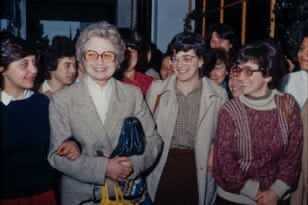
Nov 9, 2015 | Senza categoria
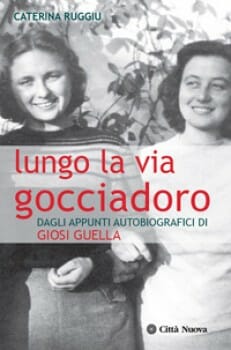 “Chiara was pointing out the stars to me along the Gocciadoro Way. I dont’recall her words. Come to think of it, it seems like she was telling me that we had to step out of our little world in order to soar in a much vaster world.” This is how Giosi Guella records her first encounters with Chiara Lubich in the spring of 1944 in Trent. Gioccadoro Way is the street where Chiara lived with her family before the bombardment of May 13, 1944 when the family home was left uninhabitable. It is also the name of the woods – now a city park – that lapped Tentino’s chief town, and it remains one of the symbolic sites of the Focolare Movement in the city where the Movement began. This is the story behind the title of the book about her life beside the Focolare’s foundress with whom she shared moments of light and of trial that accompanied the birth and the development of this new spiritual family in the Church. Amongst the first group that joined Chiara Lubich, Giosi Guella stood out for her simplicity, sincerity and concreteness. She was already living with Chiara Lubich in the autumn of 1944 at the small flat at piazza Cappuccini 2. That is where the first cell of the Focolare Movement began to form. In all the places she lived, Giosi embraced and lightened the sufferings of others, offered insightful advice, helped to find homes, employment and trust. She was the impulse for the consolidation of many focolare communities, seeing to it that joys and sorrows were shared amongst all, challenges and victories, unexpected donations that were then used to respond to requests for help. Everything contributed to the “capital of God’ that was being formed, composed of material goods, but also of needs. Giosi was the generous adminstrator of that capital. Because of her eye for the least amongst the community she was well suited to setting up the communion of goods of the first group in Trent, beginning in 1948. The communion of goods was a practice which then spread thoughout the Focolare Movement around the world. It was inspired by the early Christian communities who put their goods in common so that no one amongst them would be in need. Afterwards, as the Movement spread to other countries and different kinds of social action became necessary, Giosi continued to follow those developments. She also accompanied the early stages of the Economy of Communion project that was launched by Chiara Lubich in Brazil (1991).
“Chiara was pointing out the stars to me along the Gocciadoro Way. I dont’recall her words. Come to think of it, it seems like she was telling me that we had to step out of our little world in order to soar in a much vaster world.” This is how Giosi Guella records her first encounters with Chiara Lubich in the spring of 1944 in Trent. Gioccadoro Way is the street where Chiara lived with her family before the bombardment of May 13, 1944 when the family home was left uninhabitable. It is also the name of the woods – now a city park – that lapped Tentino’s chief town, and it remains one of the symbolic sites of the Focolare Movement in the city where the Movement began. This is the story behind the title of the book about her life beside the Focolare’s foundress with whom she shared moments of light and of trial that accompanied the birth and the development of this new spiritual family in the Church. Amongst the first group that joined Chiara Lubich, Giosi Guella stood out for her simplicity, sincerity and concreteness. She was already living with Chiara Lubich in the autumn of 1944 at the small flat at piazza Cappuccini 2. That is where the first cell of the Focolare Movement began to form. In all the places she lived, Giosi embraced and lightened the sufferings of others, offered insightful advice, helped to find homes, employment and trust. She was the impulse for the consolidation of many focolare communities, seeing to it that joys and sorrows were shared amongst all, challenges and victories, unexpected donations that were then used to respond to requests for help. Everything contributed to the “capital of God’ that was being formed, composed of material goods, but also of needs. Giosi was the generous adminstrator of that capital. Because of her eye for the least amongst the community she was well suited to setting up the communion of goods of the first group in Trent, beginning in 1948. The communion of goods was a practice which then spread thoughout the Focolare Movement around the world. It was inspired by the early Christian communities who put their goods in common so that no one amongst them would be in need. Afterwards, as the Movement spread to other countries and different kinds of social action became necessary, Giosi continued to follow those developments. She also accompanied the early stages of the Economy of Communion project that was launched by Chiara Lubich in Brazil (1991).  A biography has now been published, twenty years after her death. It is certainly not an exhastuve account, drawing upon a few writings and recorded speeches. Actually, she was not very fond of writing; she preferred to be “doing”. These pages are therefore quite precious, extraordinarily frank and disarmingly simple. I entrusted myself to those writings, on the edge between news and history, letting her speak. When the recount was interrupted, I was able to interview several people who had shared the journey of a Work of God with her, a Work “written in Heaven” that gradually unfolded on earth, following mysterious and up until then unexplored paths. Their testimonies permitted me to trace several passage of this simple, “too simple” life yet strongly interwoven with that of the Focolare to which Giosi had given all of herself, with her own particular touch. Caterina Ruggiu Lungo la via Gocciadoro, Città Nuova editrice
A biography has now been published, twenty years after her death. It is certainly not an exhastuve account, drawing upon a few writings and recorded speeches. Actually, she was not very fond of writing; she preferred to be “doing”. These pages are therefore quite precious, extraordinarily frank and disarmingly simple. I entrusted myself to those writings, on the edge between news and history, letting her speak. When the recount was interrupted, I was able to interview several people who had shared the journey of a Work of God with her, a Work “written in Heaven” that gradually unfolded on earth, following mysterious and up until then unexplored paths. Their testimonies permitted me to trace several passage of this simple, “too simple” life yet strongly interwoven with that of the Focolare to which Giosi had given all of herself, with her own particular touch. Caterina Ruggiu Lungo la via Gocciadoro, Città Nuova editrice

Nov 7, 2015 | Non categorizzato
 There has never been so much talk about labour rights as in our times; and there has never been so much worker abuse as in our times. They have provided the crowds for the rallies and the piles for all the massacres, and the flesh for all the reprisals. Those that do survive are often left homeless on the streets, without family. Once again, we are called to bounce back, to reconquer death: to do what Peter the fisherman did, who said to the Master: “We have been hard at it all night, but have not caught anything; but at your word I will cast the nets.” At the word of Jesus, with hope, after a night of blood and ruin, we need to begin again. And the Father will reward our trust. All of us are engaged in this great enterprise, both labourer and intellectual, of repairing the great social wreck, with courage and responsibility. Let us never look back and never be afraid. Behind us stand the exploiters, the tyrants that have burned our homes and jammed our freedoms, the demigods that have waged war: they are the executioners and gravediggers. We are moving forward, even with the cross on our shoulders, towards the Redemption that means freedom: freedom from every evil, and therefore from the need of fear.” (Igino Giordani, Fides, June 1951) “You strip work of its value when you disassociate the economic value from the spiritual value. When God came amongst us He did so as a worker amongst workers. For thirty years He performed manual labour to help the people within the circle of his family and neighbours. Then, for three years, He did spiritual work whose fruits have benefited the human family of every age. Work is innate to us humans and as necessary to life as eating and breathing. Forcing a human being to be idle is like forcing a bird not to fly. With the advent of the Redeemer – a manual labourer who was God – labour and fatigue became the divinely manufactured ordinary means of sanctification. Anyone who works in accordance with the order of God, bearing with the fatigue out of love for God, becomes holy. The work in the fields, in the office or in the Church has the same value as prayer does. The salary is also doubled. On the human level, you are paid for the economic value produced by your handiwork and genius; on the divine level, you are paid for the merits of your patience, asceticism and detachment. As you build you bear with the fatigue, transforming it into the raw material of redemption, and you also build another stretch of the road to your eternal destiny. The prodigal son began his recovery when he began to work, just as he had begun his deterioration when he began to be idle. The real exploitation of work and of the worker comes about in proportion to the materialistic pretence of denying participation of the spirit in the works of the hand or of the mind: pulling apart the divine and the human, the spirit and the corporal, the moral and the economic, Our Father in Heaven the daily bread that needs to be served to us every day on earth. A person does not only live on bread for the stomach, but is also in need of nourishment for the soul. Pressing someone into a merely economic existence is like feeding only half of him while destroying him by starving the other half. The God Man saw and always sees the divine and the human not only one or the other, but both. Since the fishermen and their guests have not caught a single fish during an entire night of hard effort, and since the norm Jesus follows is ‘whoever does not work, does not eat,’ He invites them and their hungry families to go back to work, to recast the nets into the waters of the lake. God continually invites us not to be discouraged, not to despair but to get back to work again, always in His name. Like a human person, society also needs both works so that it can breathe with both lungs and live healthy and free. If not, it languishes, since it suffers either from bodily hunger or from spiritual hunger: one hunger brings the other. If there is no Father in Heaven, the bread on earth also becomes scarce because, without Him, the labourers are no longer brothers and sisters. They fight and steal, as happened and continues to happen to many of our immigrants who are opposed and rejected by other workers.” (Igino Giordani La Via, 1952)
There has never been so much talk about labour rights as in our times; and there has never been so much worker abuse as in our times. They have provided the crowds for the rallies and the piles for all the massacres, and the flesh for all the reprisals. Those that do survive are often left homeless on the streets, without family. Once again, we are called to bounce back, to reconquer death: to do what Peter the fisherman did, who said to the Master: “We have been hard at it all night, but have not caught anything; but at your word I will cast the nets.” At the word of Jesus, with hope, after a night of blood and ruin, we need to begin again. And the Father will reward our trust. All of us are engaged in this great enterprise, both labourer and intellectual, of repairing the great social wreck, with courage and responsibility. Let us never look back and never be afraid. Behind us stand the exploiters, the tyrants that have burned our homes and jammed our freedoms, the demigods that have waged war: they are the executioners and gravediggers. We are moving forward, even with the cross on our shoulders, towards the Redemption that means freedom: freedom from every evil, and therefore from the need of fear.” (Igino Giordani, Fides, June 1951) “You strip work of its value when you disassociate the economic value from the spiritual value. When God came amongst us He did so as a worker amongst workers. For thirty years He performed manual labour to help the people within the circle of his family and neighbours. Then, for three years, He did spiritual work whose fruits have benefited the human family of every age. Work is innate to us humans and as necessary to life as eating and breathing. Forcing a human being to be idle is like forcing a bird not to fly. With the advent of the Redeemer – a manual labourer who was God – labour and fatigue became the divinely manufactured ordinary means of sanctification. Anyone who works in accordance with the order of God, bearing with the fatigue out of love for God, becomes holy. The work in the fields, in the office or in the Church has the same value as prayer does. The salary is also doubled. On the human level, you are paid for the economic value produced by your handiwork and genius; on the divine level, you are paid for the merits of your patience, asceticism and detachment. As you build you bear with the fatigue, transforming it into the raw material of redemption, and you also build another stretch of the road to your eternal destiny. The prodigal son began his recovery when he began to work, just as he had begun his deterioration when he began to be idle. The real exploitation of work and of the worker comes about in proportion to the materialistic pretence of denying participation of the spirit in the works of the hand or of the mind: pulling apart the divine and the human, the spirit and the corporal, the moral and the economic, Our Father in Heaven the daily bread that needs to be served to us every day on earth. A person does not only live on bread for the stomach, but is also in need of nourishment for the soul. Pressing someone into a merely economic existence is like feeding only half of him while destroying him by starving the other half. The God Man saw and always sees the divine and the human not only one or the other, but both. Since the fishermen and their guests have not caught a single fish during an entire night of hard effort, and since the norm Jesus follows is ‘whoever does not work, does not eat,’ He invites them and their hungry families to go back to work, to recast the nets into the waters of the lake. God continually invites us not to be discouraged, not to despair but to get back to work again, always in His name. Like a human person, society also needs both works so that it can breathe with both lungs and live healthy and free. If not, it languishes, since it suffers either from bodily hunger or from spiritual hunger: one hunger brings the other. If there is no Father in Heaven, the bread on earth also becomes scarce because, without Him, the labourers are no longer brothers and sisters. They fight and steal, as happened and continues to happen to many of our immigrants who are opposed and rejected by other workers.” (Igino Giordani La Via, 1952)
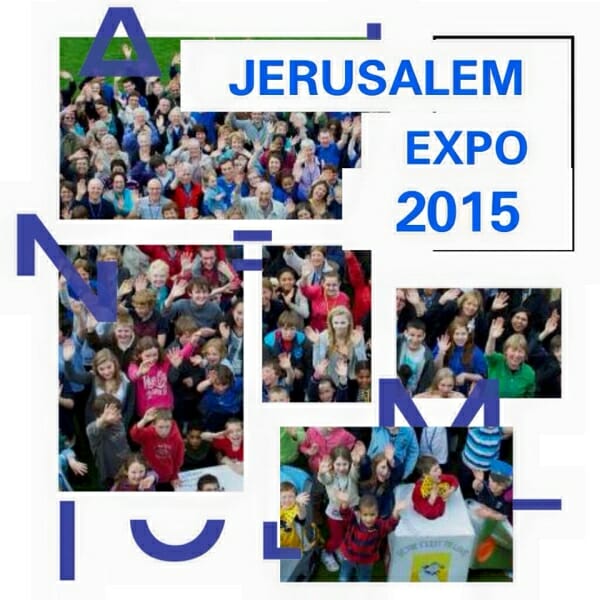
Nov 6, 2015 | Non categorizzato
 To celebrate the 50th anniversary of the Vatican Document “Nostra Aetate” Music, art, dance and live demonstration of the Jewish, Christian and Muslim communities in Jerusalem. Live streaming of the event Website: http://www.jerusalemexpo2015.com/ Facebook: https://www.facebook.com/NostraAetateJerusalem/
To celebrate the 50th anniversary of the Vatican Document “Nostra Aetate” Music, art, dance and live demonstration of the Jewish, Christian and Muslim communities in Jerusalem. Live streaming of the event Website: http://www.jerusalemexpo2015.com/ Facebook: https://www.facebook.com/NostraAetateJerusalem/
Nov 6, 2015 | Non categorizzato
The event will include a Conference (June 30-July 1, 2016) and a public outdoor rally on the following day (July 2, 2016) that will send a strong message of hope. Through testimonies, prayers and songs, the event would like to show that unity is possible and that reconciliation is the door to unity in diversity. This has been the experience of the Communities and Movements from many Churches who participate in Together for Europe for more than 15 years. Unity is possible. Living the Gospel of Jesus Christ can overcome the divisions amongst individuals, populations, parties, cultures and even Churches and non-denominational groups. The Seven Yeses offers a summary of the commitments of Together for Europe 2016. Event Program
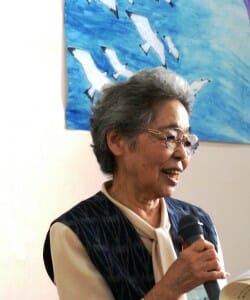
Nov 6, 2015 | Focolare Worldwide
 “On August 22, 1944, I lost my only sister in the Tsushima Maru naval disaster.” The passenger ship was sunk by an American submarine. More than 1,400 civilians lost their lives, including 700 children. “Up until the day of her death at the age of 96, my mother continued to say: “The war ate her on me. . .” Mrs Toshiko Tsuhako spoke from the bottom of her heart as she recounted her story to us. Her city, on Okinawa Island, had been the theatre of the only land battle in Japan through the months of April, May and June 1945, leaving 150,000 dead. “I was just an innocent child when I found myself thrown into the tragic experience of war, in contact with painful wounds that it inflicts on the bodies and the spirits of people. The war ended when I was 12 years old. My mother had a fragile constitution and, since I was the only daughter now, I devoted all my strength to trying to support and alleviate her afflictions. At the age of 16 I met the Christian faith and received the grace of Baptism.” As an adult she came into contact with the Focolare spirituality: “I was quite surprised when I heard that the foundress, Chiara Lubich, had come to understand, in the midst of the Second World War, that God loves us immensely and that we are all brothers and sisters who aspire to a united world, because this coincided exactly with the great dream that I carried inside me from when I was a young teenager.” “Although I was aware that everything that happens is in God’s hands, countless times I would wonder: ‘Why are there still such cruel and painful wars?’, while I continued on dreaming of a ‘global Family’ where the people live mutual gratitude and communion.” “I think that God is in need of our collaboration in building a truly peaceful world. It is true that we should cultivate hearts that love their own lands, but more than anything we should cultivate sensitive souls that devote themselves to the good of others, souls that know how to love.” “On this anniversary of the termination of the war,” Toshiko testifies, “I renew my trust in God and my commitment to continue along the path of peacebuilding.”
“On August 22, 1944, I lost my only sister in the Tsushima Maru naval disaster.” The passenger ship was sunk by an American submarine. More than 1,400 civilians lost their lives, including 700 children. “Up until the day of her death at the age of 96, my mother continued to say: “The war ate her on me. . .” Mrs Toshiko Tsuhako spoke from the bottom of her heart as she recounted her story to us. Her city, on Okinawa Island, had been the theatre of the only land battle in Japan through the months of April, May and June 1945, leaving 150,000 dead. “I was just an innocent child when I found myself thrown into the tragic experience of war, in contact with painful wounds that it inflicts on the bodies and the spirits of people. The war ended when I was 12 years old. My mother had a fragile constitution and, since I was the only daughter now, I devoted all my strength to trying to support and alleviate her afflictions. At the age of 16 I met the Christian faith and received the grace of Baptism.” As an adult she came into contact with the Focolare spirituality: “I was quite surprised when I heard that the foundress, Chiara Lubich, had come to understand, in the midst of the Second World War, that God loves us immensely and that we are all brothers and sisters who aspire to a united world, because this coincided exactly with the great dream that I carried inside me from when I was a young teenager.” “Although I was aware that everything that happens is in God’s hands, countless times I would wonder: ‘Why are there still such cruel and painful wars?’, while I continued on dreaming of a ‘global Family’ where the people live mutual gratitude and communion.” “I think that God is in need of our collaboration in building a truly peaceful world. It is true that we should cultivate hearts that love their own lands, but more than anything we should cultivate sensitive souls that devote themselves to the good of others, souls that know how to love.” “On this anniversary of the termination of the war,” Toshiko testifies, “I renew my trust in God and my commitment to continue along the path of peacebuilding.”
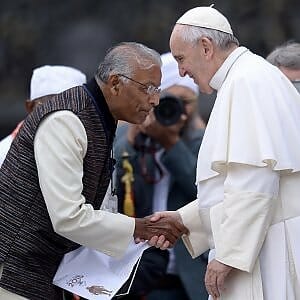
Nov 5, 2015 | Non categorizzato
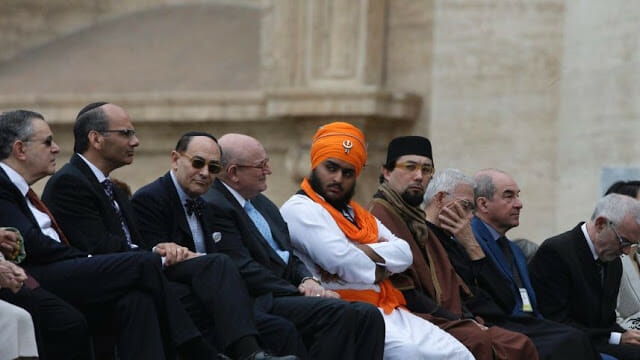 On 28 October 1965 at the conclusion of the historical assembly of bishops of the Catholic Church, the Council Fathers promulgated Nostra Aetate, the shortest document ever to be issued by the council’s working sessions. Half a century has passed since then, and the impact of those few pages revealed to be prophetic considering that the Catholic Church had passed centuries in the more or less firm conviction that there was ”no salvation outside the Church” – the famous Latin adage extra ecclesiam nulla salus. In February 2013, a few days before announcing his ”retirement” and upon reflecting on the Council at the end of the celebration of its 50th anniversary, Benedict XVI defined this document as a « trilogy that revealed its importance only in the course of decades,» along with Gaudium et Spes and religious freedom. In effect Nostra Aetate opened the Christian world’s horizon towards the others in their ”otherness,” but the management of which, according to the council’s procedures was not at all easy. At the personal suggestion of the French-Jewish historian, Jules Isaac to John XXIII, the Pope entrusted the initial scheme to Cardinal Bea. The idea was to draft a document that would contribute to prevent the repetition of tragedies like the Shoà, but after long and complex debates, the Council laid down a few pages addressing all the religions of the world. In effect, through a laborious and difficult process, the document opened to all the main religious faiths, undoubtedly and particularly stressing the confrontation with Judaism and Islam. Nostra Aetate underlines how the Jews should be presented in a positive manner: “They should not be presented as God’s rejects or as accursed, almost as if this came from the Holy Scriptures.” Above all, it excludes Israel’s collective responsibility for the death of Jesus. Therefore, this radically changed the views the Christian and Catholic world had of Israel for two millenniums. Likewise, a great respect emerged also towards Islam. “The Church regards Muslims with esteem” – declared the document – and “if in the course of the centuries, many disagreements and hostilities arose between Christians and Muslims, the Holy Council urges all to forget the past and sincerely practice mutual understanding, and together defend and promote social justice, moral values, peace and liberty for all.” As earlier said, also the recognition of the traditions of Hinduism and Buddhism is clearly highlighted, without forgetting the traditional religions. In fact, the document also affirms that “the Catholic Church does not reject what is true and holy in these religions.” What history often has not recognised as religions are now valued by Catholic tradition which acknowledges the presence of truth and sanctity also in their traditions.
On 28 October 1965 at the conclusion of the historical assembly of bishops of the Catholic Church, the Council Fathers promulgated Nostra Aetate, the shortest document ever to be issued by the council’s working sessions. Half a century has passed since then, and the impact of those few pages revealed to be prophetic considering that the Catholic Church had passed centuries in the more or less firm conviction that there was ”no salvation outside the Church” – the famous Latin adage extra ecclesiam nulla salus. In February 2013, a few days before announcing his ”retirement” and upon reflecting on the Council at the end of the celebration of its 50th anniversary, Benedict XVI defined this document as a « trilogy that revealed its importance only in the course of decades,» along with Gaudium et Spes and religious freedom. In effect Nostra Aetate opened the Christian world’s horizon towards the others in their ”otherness,” but the management of which, according to the council’s procedures was not at all easy. At the personal suggestion of the French-Jewish historian, Jules Isaac to John XXIII, the Pope entrusted the initial scheme to Cardinal Bea. The idea was to draft a document that would contribute to prevent the repetition of tragedies like the Shoà, but after long and complex debates, the Council laid down a few pages addressing all the religions of the world. In effect, through a laborious and difficult process, the document opened to all the main religious faiths, undoubtedly and particularly stressing the confrontation with Judaism and Islam. Nostra Aetate underlines how the Jews should be presented in a positive manner: “They should not be presented as God’s rejects or as accursed, almost as if this came from the Holy Scriptures.” Above all, it excludes Israel’s collective responsibility for the death of Jesus. Therefore, this radically changed the views the Christian and Catholic world had of Israel for two millenniums. Likewise, a great respect emerged also towards Islam. “The Church regards Muslims with esteem” – declared the document – and “if in the course of the centuries, many disagreements and hostilities arose between Christians and Muslims, the Holy Council urges all to forget the past and sincerely practice mutual understanding, and together defend and promote social justice, moral values, peace and liberty for all.” As earlier said, also the recognition of the traditions of Hinduism and Buddhism is clearly highlighted, without forgetting the traditional religions. In fact, the document also affirms that “the Catholic Church does not reject what is true and holy in these religions.” What history often has not recognised as religions are now valued by Catholic tradition which acknowledges the presence of truth and sanctity also in their traditions. 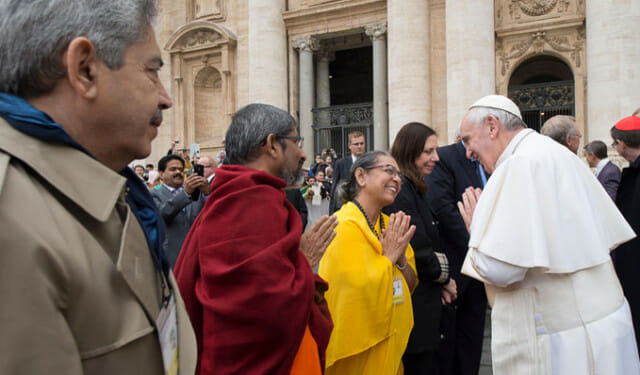 Today, a great variety of events are being celebrated in various parts of the world to reflect on the value of Nostra Aetate and the consequences it has brought about between men and women of different religious traditions. Amongst all is the particularly important event held at the Pontifical Gregorian University and organized by the Pontifical Council for Interreligious Dialogue. For three days, from 26 to 28 October, about 400 people of diverse geographic, cultural and religious areas met and reflected together on what has come about over the last 50 years. There were representatives of all the major religions of the world (Jews, Muslims, Hindus, Jainists, Buddhists, and Sikhs and those of the Tenri-kyo and the traditional African religions). They reflected on highly relevant themes today, violence, commitment to peace, the challenge of religious freedom, education and transmission of values.
Today, a great variety of events are being celebrated in various parts of the world to reflect on the value of Nostra Aetate and the consequences it has brought about between men and women of different religious traditions. Amongst all is the particularly important event held at the Pontifical Gregorian University and organized by the Pontifical Council for Interreligious Dialogue. For three days, from 26 to 28 October, about 400 people of diverse geographic, cultural and religious areas met and reflected together on what has come about over the last 50 years. There were representatives of all the major religions of the world (Jews, Muslims, Hindus, Jainists, Buddhists, and Sikhs and those of the Tenri-kyo and the traditional African religions). They reflected on highly relevant themes today, violence, commitment to peace, the challenge of religious freedom, education and transmission of values.  The convention was opened by Card. Jean-Louis Tauran, President of the Pontifical Council for Interreligious and by Card. Kurt Koch President of the Pontifical Council for Dialogue for the Promotion of Unity among Christians, and ended with a valuable and articulated reflection on ”Educating toward peace” by the Secretary of State, Card. Pietro Parolin. The participants then took part in the Audience in St. Peter’s square where Pope Francis dedicated his catechesis precisely to Nostra Aetate. He proposed a road-map for the future of dialogue, and encouraged all to work together for the poor, justice, the environment, and of course, peace. Rita Mousalem and Roberto Catalano, co-directors of the Centre for Interreligious Dialogue of the Focolare Movement, participated in the convention and conveyed the greetings of Maria Voce and the Movement when they briefly presented the important features of the Focolare’s interreligious dialogue and ensured the commitment of its members in continuing to work for the encounter and friendship between men and women of diverse faiths. Roberto Catalano
The convention was opened by Card. Jean-Louis Tauran, President of the Pontifical Council for Interreligious and by Card. Kurt Koch President of the Pontifical Council for Dialogue for the Promotion of Unity among Christians, and ended with a valuable and articulated reflection on ”Educating toward peace” by the Secretary of State, Card. Pietro Parolin. The participants then took part in the Audience in St. Peter’s square where Pope Francis dedicated his catechesis precisely to Nostra Aetate. He proposed a road-map for the future of dialogue, and encouraged all to work together for the poor, justice, the environment, and of course, peace. Rita Mousalem and Roberto Catalano, co-directors of the Centre for Interreligious Dialogue of the Focolare Movement, participated in the convention and conveyed the greetings of Maria Voce and the Movement when they briefly presented the important features of the Focolare’s interreligious dialogue and ensured the commitment of its members in continuing to work for the encounter and friendship between men and women of diverse faiths. Roberto Catalano
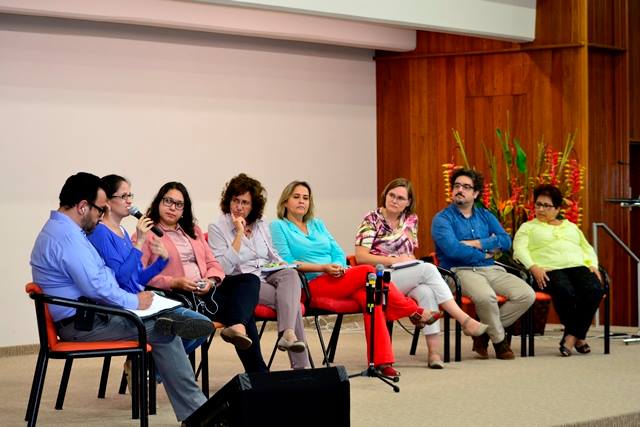
Nov 4, 2015 | Focolare Worldwide
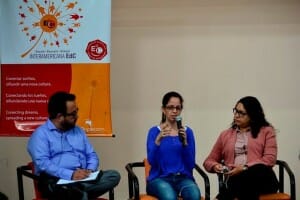 Connect dreams and spread a new culture was the title of an inter-American workshop by the Economy of Communion, which was held on October 26-31 at Mariapolis Ginetta, San Paolo, Brazil. Mariapolis Ginetta is the place where Chiara Lubich’s inspiration for the EoC was born in 1991. Sixty young people from Paraguay, Argentina, Mexico, Guatemala, Cuba, Colombia,, Bolivia and Brazil attended the even and have decided to embrace the EoC project and its innovative principles as they were first presented by the Focolare foundress. The business owners promised to accompany the young people on this difficult path. At the conclusion of the school every student received a certificate of participation from their partner. Thus a new form of communion was begun that has been called “Operation one for one”. Clézia Maria Pinto, head projects for Anpecom (the association that coordinates Economy of Communion projects in Brazil), announced the launching of a financial support programme for small businesses that operate in socially vulnerable situations, offering nutritional products or services in favour of educaiton health and housing, as well as to projects that focus on middle, low-income, and the neediest groups. The programme is inspired by projects that are already underway in other areas of the world, that offer funding and benefits linked to general adherence to the EoC.
Connect dreams and spread a new culture was the title of an inter-American workshop by the Economy of Communion, which was held on October 26-31 at Mariapolis Ginetta, San Paolo, Brazil. Mariapolis Ginetta is the place where Chiara Lubich’s inspiration for the EoC was born in 1991. Sixty young people from Paraguay, Argentina, Mexico, Guatemala, Cuba, Colombia,, Bolivia and Brazil attended the even and have decided to embrace the EoC project and its innovative principles as they were first presented by the Focolare foundress. The business owners promised to accompany the young people on this difficult path. At the conclusion of the school every student received a certificate of participation from their partner. Thus a new form of communion was begun that has been called “Operation one for one”. Clézia Maria Pinto, head projects for Anpecom (the association that coordinates Economy of Communion projects in Brazil), announced the launching of a financial support programme for small businesses that operate in socially vulnerable situations, offering nutritional products or services in favour of educaiton health and housing, as well as to projects that focus on middle, low-income, and the neediest groups. The programme is inspired by projects that are already underway in other areas of the world, that offer funding and benefits linked to general adherence to the EoC.  In the invitation, those who worked in preparing the workshop, wrote to their peers: “Let us not give up in front of social injustice and inequality” and posed a challenging question: “What if this change were to begin from becoming aware of what poverty, economy, work and interpersonal relations are?” These were only some of the topics that were presented during roundtable discussions, small group meetings where the main actors were the young people themselves and their expert business owners who had years of experience under their belts. In his final remarks, Anouk Grevin from the International Commission of the EoC admitted that there was the hope that the present workshop would function as a laboratory that would open new roads for the EoC not only in Latin America, but around the world.
In the invitation, those who worked in preparing the workshop, wrote to their peers: “Let us not give up in front of social injustice and inequality” and posed a challenging question: “What if this change were to begin from becoming aware of what poverty, economy, work and interpersonal relations are?” These were only some of the topics that were presented during roundtable discussions, small group meetings where the main actors were the young people themselves and their expert business owners who had years of experience under their belts. In his final remarks, Anouk Grevin from the International Commission of the EoC admitted that there was the hope that the present workshop would function as a laboratory that would open new roads for the EoC not only in Latin America, but around the world.

Nov 3, 2015 | Senza categoria
On the bus I was on Bus 45 which I take to work every day, when a man clearly in a bad mood climbed on. People who had realized this moved out of his way and avoided him. I, however, remained where I was and helped him with the plastic bags he was carrying. My day seemed to become brighter. Another day, on the same bus, there was the same man again. As soon as he saw me, he came to greet me. And this continued to happen. Even a very small gesture is enough to let another person, any neighbor whom I encounter throughout my day, feel welcomed and loved. E.M. – Hungary  Tattoos On the train, I was sitting next to a girl and a boy covered in tattoos of a satanic nature. My propensity to look for the positive aspects in others made me think that those two must have a reason for displaying such symbols. After some hesitation, I got up my courage and asked them the meaning of their tattoos. Their eyes lit up. They took turns answering me, but each with the same sweetness: “We are grateful that you asked this question. Usually, people judge us and in the best case scenario, pretend they don’t see us. We aren’t what we seem, we only want to shake up this paralyzed and spineless society.” M.I. – France A carriage for Jamal It was Sunday afternoon. Jamal, a Moroccan worker I know, had brought me some apples. Talking with him, I found out that he was expecting a child to be born in December. However, they did not have any of the things necessary for the baby; above all, they would need a baby carriage. After listening attentively to him, an idea came to me: “Why don’t we ask God’s help together, the two of us? God is the same for everyone, you can call him by another name, but he’s still God. He will know how to find us a baby carriage.” Jamal liked the idea. We were in the open courtyard; we lifted our eyes towards heaven and we prayed as follows: “Lord God, we need a baby carriage. Please take care of it.” We were a young Muslim man and a Catholic woman: two different faiths, yet united in the asking. God accepted our prayer: the following Thursday the requested carriage arrived as a gift. V.M. – Italy
Tattoos On the train, I was sitting next to a girl and a boy covered in tattoos of a satanic nature. My propensity to look for the positive aspects in others made me think that those two must have a reason for displaying such symbols. After some hesitation, I got up my courage and asked them the meaning of their tattoos. Their eyes lit up. They took turns answering me, but each with the same sweetness: “We are grateful that you asked this question. Usually, people judge us and in the best case scenario, pretend they don’t see us. We aren’t what we seem, we only want to shake up this paralyzed and spineless society.” M.I. – France A carriage for Jamal It was Sunday afternoon. Jamal, a Moroccan worker I know, had brought me some apples. Talking with him, I found out that he was expecting a child to be born in December. However, they did not have any of the things necessary for the baby; above all, they would need a baby carriage. After listening attentively to him, an idea came to me: “Why don’t we ask God’s help together, the two of us? God is the same for everyone, you can call him by another name, but he’s still God. He will know how to find us a baby carriage.” Jamal liked the idea. We were in the open courtyard; we lifted our eyes towards heaven and we prayed as follows: “Lord God, we need a baby carriage. Please take care of it.” We were a young Muslim man and a Catholic woman: two different faiths, yet united in the asking. God accepted our prayer: the following Thursday the requested carriage arrived as a gift. V.M. – Italy
Nov 2, 2015 | Non categorizzato
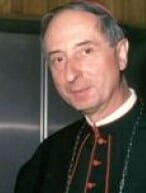
Nov 1, 2015 | Non categorizzato

Klaus Hemmerle

 “Chiara was pointing out the stars to me along the Gocciadoro Way. I dont’recall her words. Come to think of it, it seems like she was telling me that we had to step out of our little world in order to soar in a much vaster world.” This is how Giosi Guella records her first encounters with Chiara Lubich in the spring of 1944 in Trent. Gioccadoro Way is the street where Chiara lived with her family before the bombardment of May 13, 1944 when the family home was left uninhabitable. It is also the name of the woods – now a city park – that lapped Tentino’s chief town, and it remains one of the symbolic sites of the Focolare Movement in the city where the Movement began. This is the story behind the title of the book about her life beside the Focolare’s foundress with whom she shared moments of light and of trial that accompanied the birth and the development of this new spiritual family in the Church. Amongst the first group that joined Chiara Lubich, Giosi Guella stood out for her simplicity, sincerity and concreteness. She was already living with Chiara Lubich in the autumn of 1944 at the small flat at piazza Cappuccini 2. That is where the first cell of the Focolare Movement began to form. In all the places she lived, Giosi embraced and lightened the sufferings of others, offered insightful advice, helped to find homes, employment and trust. She was the impulse for the consolidation of many focolare communities, seeing to it that joys and sorrows were shared amongst all, challenges and victories, unexpected donations that were then used to respond to requests for help. Everything contributed to the “capital of God’ that was being formed, composed of material goods, but also of needs. Giosi was the generous adminstrator of that capital. Because of her eye for the least amongst the community she was well suited to setting up the communion of goods of the first group in Trent, beginning in 1948. The communion of goods was a practice which then spread thoughout the Focolare Movement around the world. It was inspired by the early Christian communities who put their goods in common so that no one amongst them would be in need. Afterwards, as the Movement spread to other countries and different kinds of social action became necessary, Giosi continued to follow those developments. She also accompanied the early stages of the Economy of Communion project that was launched by Chiara Lubich in Brazil (1991).
“Chiara was pointing out the stars to me along the Gocciadoro Way. I dont’recall her words. Come to think of it, it seems like she was telling me that we had to step out of our little world in order to soar in a much vaster world.” This is how Giosi Guella records her first encounters with Chiara Lubich in the spring of 1944 in Trent. Gioccadoro Way is the street where Chiara lived with her family before the bombardment of May 13, 1944 when the family home was left uninhabitable. It is also the name of the woods – now a city park – that lapped Tentino’s chief town, and it remains one of the symbolic sites of the Focolare Movement in the city where the Movement began. This is the story behind the title of the book about her life beside the Focolare’s foundress with whom she shared moments of light and of trial that accompanied the birth and the development of this new spiritual family in the Church. Amongst the first group that joined Chiara Lubich, Giosi Guella stood out for her simplicity, sincerity and concreteness. She was already living with Chiara Lubich in the autumn of 1944 at the small flat at piazza Cappuccini 2. That is where the first cell of the Focolare Movement began to form. In all the places she lived, Giosi embraced and lightened the sufferings of others, offered insightful advice, helped to find homes, employment and trust. She was the impulse for the consolidation of many focolare communities, seeing to it that joys and sorrows were shared amongst all, challenges and victories, unexpected donations that were then used to respond to requests for help. Everything contributed to the “capital of God’ that was being formed, composed of material goods, but also of needs. Giosi was the generous adminstrator of that capital. Because of her eye for the least amongst the community she was well suited to setting up the communion of goods of the first group in Trent, beginning in 1948. The communion of goods was a practice which then spread thoughout the Focolare Movement around the world. It was inspired by the early Christian communities who put their goods in common so that no one amongst them would be in need. Afterwards, as the Movement spread to other countries and different kinds of social action became necessary, Giosi continued to follow those developments. She also accompanied the early stages of the Economy of Communion project that was launched by Chiara Lubich in Brazil (1991).  A biography has now been published, twenty years after her death. It is certainly not an exhastuve account, drawing upon a few writings and recorded speeches. Actually, she was not very fond of writing; she preferred to be “doing”. These pages are therefore quite precious, extraordinarily frank and disarmingly simple. I entrusted myself to those writings, on the edge between news and history, letting her speak. When the recount was interrupted, I was able to interview several people who had shared the journey of a Work of God with her, a Work “written in Heaven” that gradually unfolded on earth, following mysterious and up until then unexplored paths. Their testimonies permitted me to trace several passage of this simple, “too simple” life yet strongly interwoven with that of the Focolare to which Giosi had given all of herself, with her own particular touch. Caterina Ruggiu Lungo la via Gocciadoro, Città Nuova editrice
A biography has now been published, twenty years after her death. It is certainly not an exhastuve account, drawing upon a few writings and recorded speeches. Actually, she was not very fond of writing; she preferred to be “doing”. These pages are therefore quite precious, extraordinarily frank and disarmingly simple. I entrusted myself to those writings, on the edge between news and history, letting her speak. When the recount was interrupted, I was able to interview several people who had shared the journey of a Work of God with her, a Work “written in Heaven” that gradually unfolded on earth, following mysterious and up until then unexplored paths. Their testimonies permitted me to trace several passage of this simple, “too simple” life yet strongly interwoven with that of the Focolare to which Giosi had given all of herself, with her own particular touch. Caterina Ruggiu Lungo la via Gocciadoro, Città Nuova editrice









